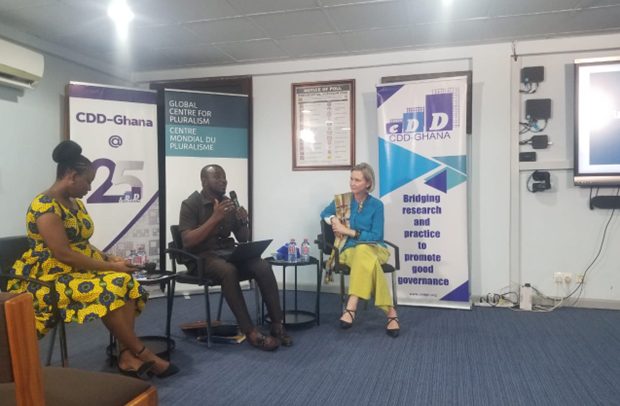Panel discussion at the launch of the Global Pluralism Monitors report
The Global Pluralism Monitor, an innovative measurement tool designed to assess the diversity within a political body around the world has rated Ghana high in its latest report.
This was focused on the diversity of ethnicities, religions, migrants and the north-south regional divide with a gender lens.
The report revealed that Ghana has a strong constitution that recognizes all social and cultural groups.
It also protects vulnerable groups including religious and ethno-cultural minorities, indigenous groups, women and girls from discrimination.
Speaking at the launch of the report, Program Officer, Global Centre for Pluralism, Rajvir Gill, said Ghana has adopted and ratified international and regional commitments on the rights of women, refugees, children, migrants, victims of genocides and in areas of social, economic, political, cultural and civic rights.
She added that some progress has been made in patriating these international and regional treaties into domestic law.
Under Ghana’s international commitments, the report revealed that an average of nine out of 10 marks was awarded for its commitment to engaging with international monitoring mechanisms.
According to the UN Treaty Database, Ghana is known for submitting state party reports on a number of treaties of relevance to the identified group of interest.
In the same vein it scored an average of nine under Inclusive Citizenship. This indicates that no group is denied Ghanaian citizenship on the basis of race, ethnicity, gender or religion.
Additionally, the Claims-Making and Contestation section was also awarded eight because Ghana’s constitution guarantees freedom of assembly. This allows interest groups to demonstrate and make demands in a peaceful and lawful manner.
A score of eight was given for civil society involvement in ensuring that governments and political parties and religious groups adhere to the constitutional provision.
It stated that Ghana has a vibrant, pluralist and independent network of CSOs who over the years have played an active role in promoting social inclusion and pluralistic values.
The report scored seven under the political parties segment in which it was stressed that the two major political parties in Ghana have shown their commitment to pluralism by electing people from a variety of ethnicities, religions and genders into their leadership.
They both have strong ethnic-based support (NPP enjoys massive support from the Ashanti and Eastern Region while the NDC enjoys massive support in the Volta Region).
In the case of culture which was scored eight noted that Ghana is a highly diverse country comprised of multiple ethno-linguistic groups, diverse cultures and religious affiliations. It further revealed that all social groups and cultures are accorded dignity and respect.
The report revealed that the various indicators had some challenged in their finding. This has to do with the lack of political commitment and resources needed to build and maintain institutions such as NCCE, CHRAG.
According to the report, parliament should prioritize the passage of the Affirmative Action Bill for promoting women’s equal participation in parliament as well as representation in politics.
“It is imperative that state institutions such as NCCE and CHRAJ are adequately funded to meet their mandates,” it said.
BY Prince Fiifi Yorke


